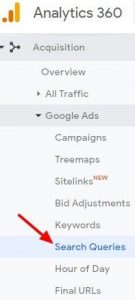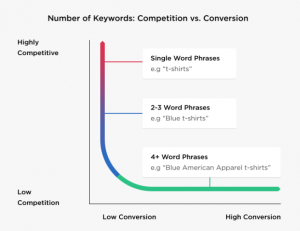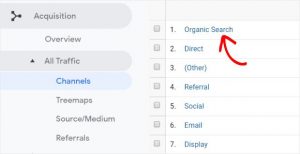Choosing keywords is the foundation of successful search engine optimization.
Do you know the joke about a wife asking her husband, a SEO specialist, where does he want to go out and he replies: a bar, Irish, pub, saloon, tavern, lounge, inn, saloon, barroom, roadhouse, taproom, after-hours joint, drinker, drinking establishment, gin mill, public house….
The importance of keyword research for SEO cannot be overstated. Your SEO success and website traffic both depend on it, and your company’s success is becoming increasingly dependent on it. However, selecting the best SEO keywords for your website content is a difficult task. Especially for small and medium-sized enterprises, whose domain authority is nowhere near that of the big Inc. of the world.
It is important to know the terms people use to look for your product. What is their intent? For example, suppose that someone is looking for a coffee. What might they search for? Latte, Cappuccino, Americano or simply a Coffee-Shop. You need to find the term people use most often when searching. It is highly advised to match your website content to what people are looking for. If there is not going to be a match, visitors will stay longer on your site, increasing the bounce rate (the share of visitors that leave a web page without taking an action, such as clicking on a link, filling out a form or making a purchase).
Here are two important points you should consider when choosing the keywords for your SEO plan:
Frequency – the number of times the keyword or the term people are searching for is used – should be on your website concerning your product. It might be difficult to differentiate your website on highly searched for terms. The keyword you select should closely match what you offer. If you only sell coffee beans and someone comes to your site looking for a coffee shop, there is not going to be a match. Google offers Google-Search-Console for free, so you will be able to see which pages appear in search and get more traffic.
Competition – if your keywords are competing high competition terms, try to adjust them to a less competitive term by using the LONG TAIL of SEO.
For example: instead of “coffee”, try “fresh coffee delivery in Lucerne”. This might give you more immediate SEO results. Only a small number of keywords have a very high search volume therefore, often the long tail is where you will find your SEO opportunities. This will improve the ranking with fewer efforts.
One way to confidently choose SEO keywords for the best chance of ranking is to focus on your Competitive Power. Your Competitive Power is established through an evaluation of your site’s capacity to rank for competitive keywords based on previous organic traffic performance. The higher this score, the easier it will be for your site to rank for more difficult keywords. Keywords with a low level of competition are usually more specific. It is easier to create customized content that is laser-focused on search intent with more specific keyword searches.
More organic traffic and referrals are frequently rewarded for well-crafted, targeted content that answers search intent.
How to choose SEO keywords with confidence?

For a good SEO campaign, keyword research is essential. It does not, however, have to be a guessing game. The importance of keyword research for SEO cannot be overstated. You may also utilize the search words that are already driving traffic to your site as a starting point for coming up with new, relevant words for SEO, content development, and marketing. Google Analytics and Google Search Console are two places to look for them.
To find keywords in Google Analytics, go to Acquisition » All Traffic » Channels and click on Organic Search in the table.
A list of phrases will appear. The vast majority of the results will be “not provided,” resulting from encrypted browser searches.
If you have a Google Search Console account linked to your Google Analytics account, click to Acquisition » Search Console » Queries while in Analytics. There will be more information and fewer “not set” keywords.
Don’t forget about local search, which has become more important as searchers have gone mobile. A location name can also be a beneficial search term modifier, so if your company serves a specific area, remember to include it in your keyword research. This holds for seasonal search phrases as well.
There are tons of research tools for keyword like Google Adwords Keyword Planner, AnswerThePublic, and Soovle, which can help you analyze other aspects website’s performance, not just keywords. (For some tools, you will have to open an account.)
The golden role for successful SEO:
- Your site’s content should be made for human visitors! (not for search engines)
- Don’t add extra keyword or variations of keyword to your website. Creating “keywords stuffing” will reduce your search engine optimization.
- Know your audience’s problems and use their language to solve them.
- Know trends – seasonal changes might have a significant impact on your keyword efforts. Use keywords that play into seasonal sales, such as “Christmas,” “Mother’s Day,” “Independence Day,” “Summertime,” and so on, if you have a seasonal product or service that you can sell as such.
https://www.youtube.com/watch?v=DI2aJdutJ7Y
Check out my other blog posts. Which one is did you like the most? ❤️ ?







Check the links yourself – who knows it might be useful:
https://www.youtube.com/watch?v=foVEh0LGo9Q
https://blog.alexa.com/choose-seo-keywords-with-confidence/
https://www.semrush.com/blog/keyword-research-guide-for-seo/
https://www.wordstream.com/blog/ws/2021/01/12/top-seo-trends-2021






Open Sesame!
Great keyword to open doors, Carla, but it’s also delicious on pretzels. What is your intent?